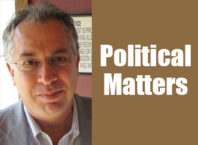By Mordecai Specktor
Denmark and Poland
In the way of a pandemic travel report, I visited Denmark and Poland in July. The usual discomfort of airline travel is enhanced by the requirement of wearing a face mask. To head off for Europe, via Icelandair, you have to present your vaccination card to the ticket agent. In Copenhagen, where my son Max lives, you have to show a vax card to enter a restaurant or music club.
(I should mention that there are Native people in Denmark: the Inuit of Greenland, which is an autonomous territory within the Kingdom of Denmark. These indigenous people are Kalaallit, Inughuit or Tunumiit.)
While traveling abroad, I learned that Europeans are banned from travel to the United States. Max will be joining us in Cincinnati in late August for a family wedding (postponed from 2020), but his girlfriend Silvia, an Italian citizen, won’t be able to join him.
The pandemic travel ban affects citizens of the 26 countries in what is known as the Schengen area – sort of a United States of Europe. When you enter the Schengen zone – my wife and I flew through Keflavik Airport in Iceland – the borders disappear; after getting your passport stamped in Iceland, you don’t have to go through passport control when entering Denmark.
I also learned that you have to present documentation of a recent negative COVID-19 test in order to return to the States. My wife and I went to a remarkably efficient testing center in Copenhagen (swab up the nose) the day before our return flight and received our documents within 20 minutes.
The brief first-time visit to Poland – Warsaw and Łódź (pronounced “Woodge”) – was the work part of the trip. I’ll be writing articles for my newspaper, the American Jewish World (ajwnews.com), about the Polish Jews. There aren’t many left. Prior to World War II, Poland was the center of the global Jewish community with 3.3 million Jews.
The Nazis killed 90 percent of the Jews in Poland. The Nazis also built all of their extermination camps in Poland, so the country’s place names now evoke feelings of repulsion and dread: Chelmno, Treblinka, Sobibór, Betzec, Majdanek and Auschwitz-Birkenau.
Oil vs. water
In July, there was heightened repression directed at Water Protectors protesting Calgary-based Enbridge, Inc.’s dirty oil pipeline, a $9.3 billion project to shoot oil from the Alberta tar sands to Superior, Wisconsin. The Minnesota leg of the replacement pipeline is half completed; however, activists have engaged in civil disobedience to stop construction in northern Minnesota.
On July 19, seven Native women, including Winona LaDuke, founder and leader of the environmental group Honor the Earth, were arrested for trespassing by Wadena County sheriff’s deputies, while they were sitting together and praying on an easement near Park Rapids at the Shell River, which the pipeline will cross in five places, according to a report in Indian Country Today. LaDuke, who’s also a correspondent for The Circle, was released from the Aitkin County jail after being locked up for three days.
“I think this is what you call the Enbridge way – make sure that hundreds of Minnesota citizens are put in jail so that they can steal 5 billion gallons of water and put the last tar sands pipeline in,” LaDuke said in an Instagram post after her release, as per Indian Country Today.
The “5 billion gallons of water” refers to the Minnesota Department of Natural Resources (DNR) amending Enbridge’s water appropriation permit in June “to allow the company to pump nearly 5 billion gallons of groundwater that seeps into the construction trenches. The company discharges the pumped water elsewhere. That’s nearly 10 times the amount previously permitted,” according to a recent Star Tribune report.
There has been growing protest over Enbridge drawing huge amounts of water in the midst of a severe drought and at least nine chemical spills into waterways during pipeline drilling. Such concerns prompted 32 DFL lawmakers to sign on to a July 27 letter to Minnesota Pollution Control Agency (MPCA) Commissioner Peter Tester, calling on regulators to halt drilling until the drought ends and to investigate the drilling mud spills.
The lawmakers wrote, in part: “We write to express our concerns with the reported releases of drilling fluid at nine separate locations along the Enbridge Line 3 pipeline route. The severe drought and excessive heat experienced throughout Minnesota impact the ability of waterways, wetlands, and marshes to effectively dilute harmful chemicals and excessive sediment. The drought is also causing rapid evaporation of waterways and could result in a lack of clean water available to assist with any cleanup of spills and releases.”





